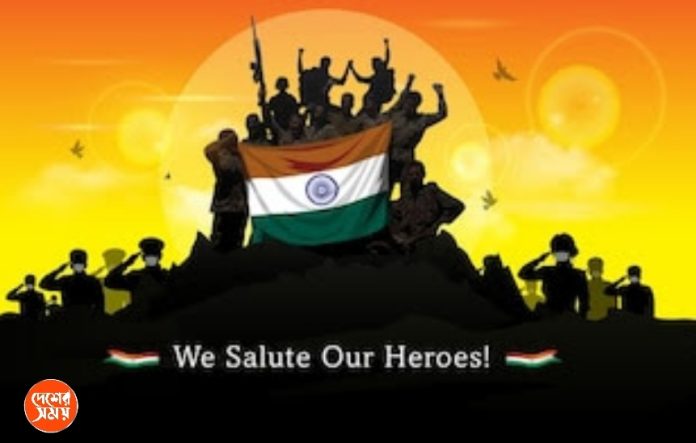
Desher Samay: In May 1999, Pakistani intruders crossed the Line of Control and flushed into the Mushkoh, Dras, Kaksar, and Batalik sectors in the Kargil region. The Indian Army launched an operation to drive them out, which was named “Operation Vijay.”
The Kargil War spanned from May 3 to July 26, extending for nearly three months. In 2024, it will mark the 25th anniversary of ‘Operation Vijay.’
In the Kargil War, over 500 Indian soldiers were martyred. The relationship between the two countries became strained at that time.
In May to July 1999, fighting occurred in the Dras-Kargil sector of Jammu and Kashmir. Continuous infiltration from the Pakistani side took place in Kargil. Initially, Pakistan claimed that terrorists were responsible. However, in his autobiography, “In the Line of Fire”, Pakistan’s then-Army Chief Pervez Musharraf later admitted that the infiltrators included troops of Pakistani soldiers. It’s considered that Musharraf thought that seeing two nuclear-armed nations at war, the international community, including the US, would intervene. This would benefit Pakistan, as they hoped to gain control over Kashmir.
Despite expectations of international intervention, the Indian military successfully compelled Pakistan’s forces to withdraw, leading India to declare victory on July 26, 1999.
Even though both India and Pakistan are nuclear-armed, they fought the Kargil War without using nuclear weapons. Both sides extensively used conventional arms during the conflict. India utilised India’s Air Force but Pakistan could not deploy its Air Force in that war because Islamabad initially denied having any role in the Kargil conflict. Pakistan claimed the terrorist association of Kashmir Mujahideen carried out the attacks . However, it was later confirmed through statements by then Prime Minister Nawaz Sharif and army chief Pervez Musharraf that Pakistan’s Paramilitary force was directly involved. During the Kargil War, both India and Pakistan were nuclear-armed, yet neither side displayed nuclear capabilities. Despite international concerns during the conflict, there was potential for nuclear escalation between the two nuclear-armed nations. In a report dated May 31, 1999, Pakistan’s Foreign Secretary Shamshad Ahmed was quoted by the Pakistani news media News of Pakistan as saying, “Pakistan can use any weapon to win the war.” Following this statement, discussions about nuclear strikes became more intense. Internationally, there were concerns that Pakistan was planning a nuclear attack on India during the Kargil War.
The India-Pakistan conflict took a terrifying turn when reports from American intelligence sources suggested that Pakistan was deploying its nuclear weapons towards the Indian border. Following this, then-President Bill Clinton reportedly made efforts to urge Nawaz Sharif to refrain from using nuclear weapons. A former White House official later revealed that Nawaz believed India was preparing for a nuclear strike against Pakistan. However, it seems Nawaz backed down under American pressure. However, India was also prepared to respond to any Pakistani aggression, as later revealed. In 2000, a defense magazine cited security expert Sanjay Badri-Maharaj, indicating that India had at least five nuclear weapons ready at that time. While the United States played a significant role during the Kargil War, neighboring China refrained from intervening in the conflict between the two countries. During the Kargil War, when Pakistan was in a precarious situation, they sought assistance from the United States. However, President Clinton’s aide .
Bruce Riedel, claimed that the United States refused to aid Pakistan to escalate the conflict further unless Pakistan withdrew its military from Indian territory.
On July 4, 1999, the Washington Agreement was signed between the United States and Pakistan. With Pakistan agreeing to withdraw its military, the Kargil War gradually subsided, although some Pakistani forces continued to engage in combat. Towards the end of July, India launched air strikes, starting an offensive that pushed Pakistani forces back from the Dras sector on July 26. India declared July 26 as “Vijay Diwas” (Victory Day). Despite China’s proximity as a neighbor to both India and Pakistan and its stake in regional stability, why did it not actively intervene to halt the conflict between its neighbors?
Regarding regional dynamics, China’s perspective concerning the Kargil conflict was crucial for both India and Pakistan. China asserted that there is no resolution of the India-Pakistan conflict, rather this could endanger peace and stability in South Asia. China’s advice was that both sides should return their troops to their respective positions along the Line of Control (LoC) and that the cessation of hostilities should occur peacefully. China also advised both India and Pakistan to show restraint.
It is believed that Beijing was attempting to suppress the Islamic movement in Xinjiang and had also tried to control the Uyghur community of Muslims who declared Jihad against the communist country . Due to these reasons, they did not take Pakistan’s side. It is also believed that they refrained from speaking out about the war due to international considerations and involvement of the United States during the Kargil conflict.




